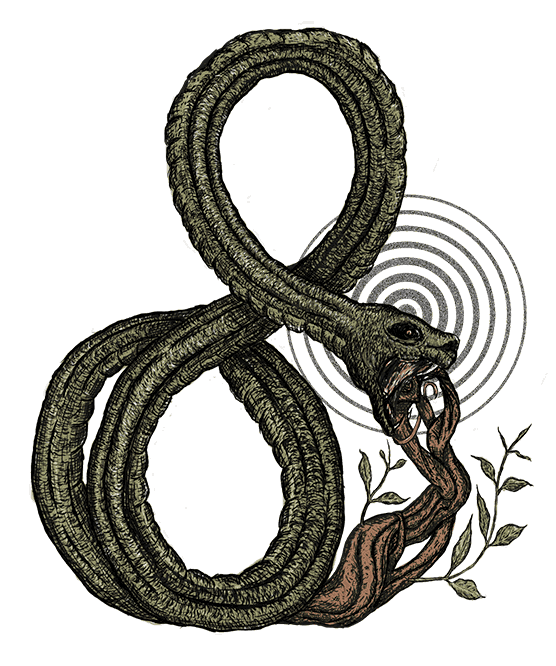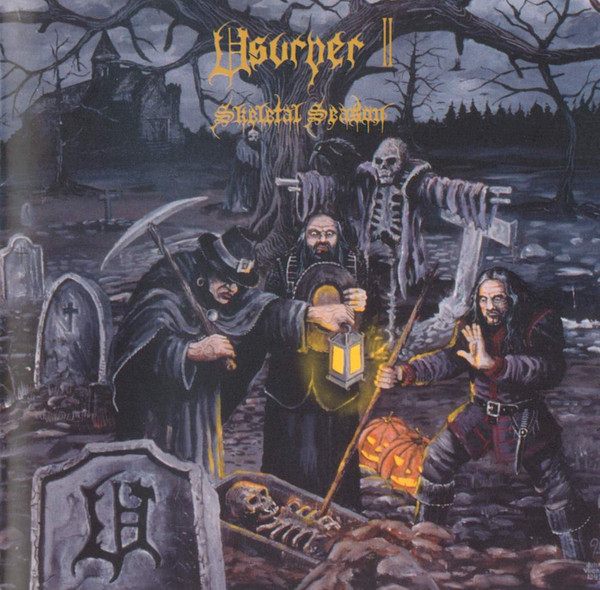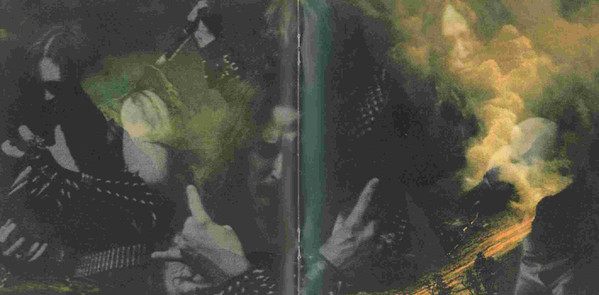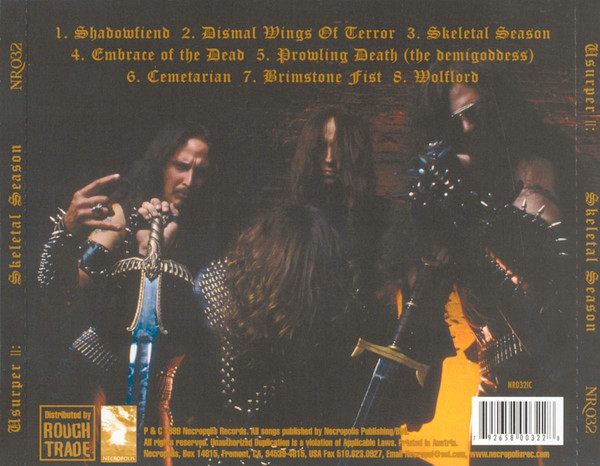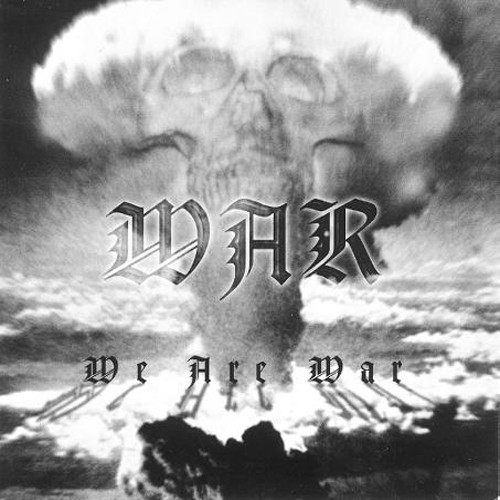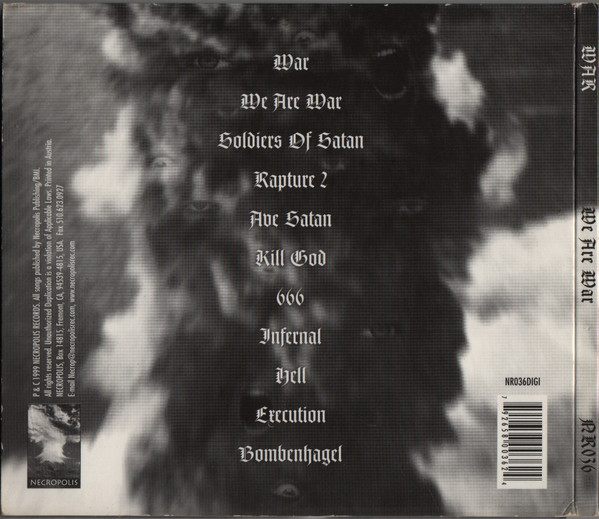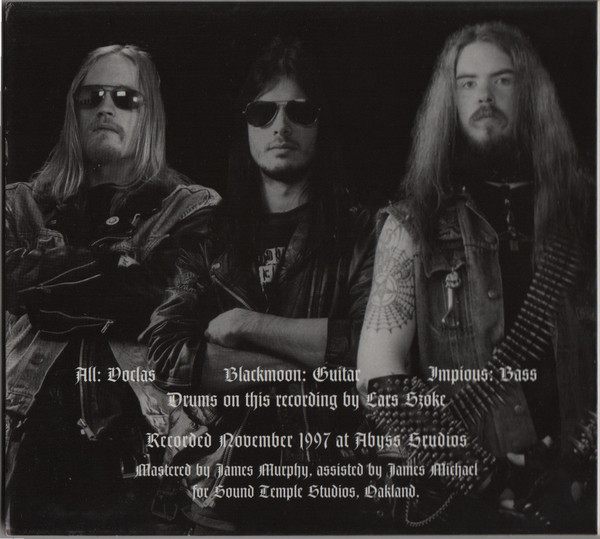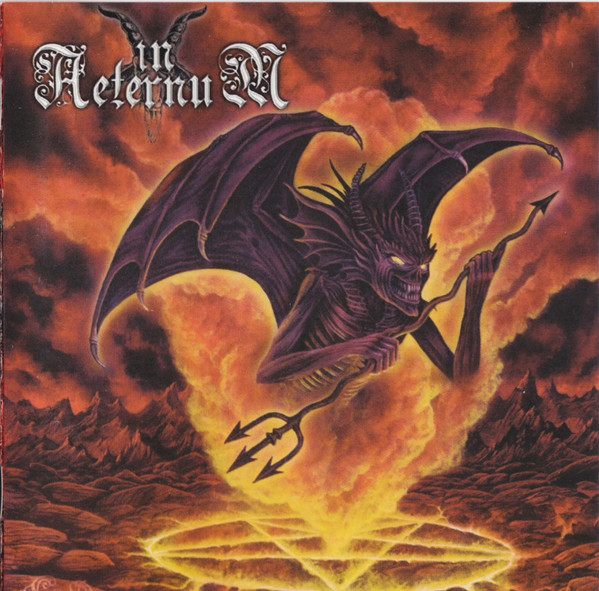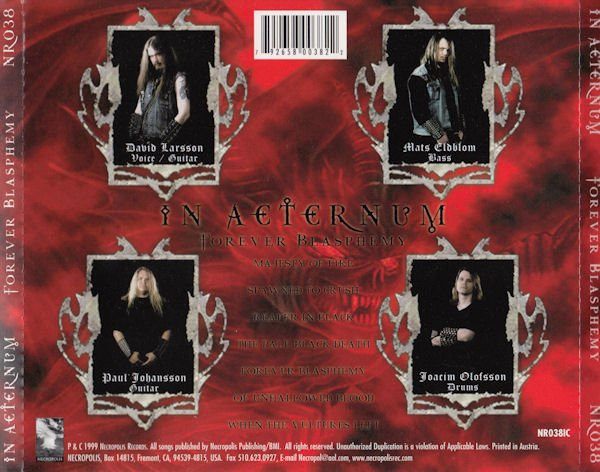Necropolis Records X
2025-11-18
by Niklas Göransson
At the close of the century, Necropolis stood at a crossroads of loyalty and ambition. What began as a crusade of devotion now demanded strategy, sacrifice, and the cold calculus of survival.
PAUL TYPHON: When the True Satanist Horde dissolved and IT went missing, I started losing faith in the Swedish black metal crowd. Instead, I wanted to focus on bands like USURPER – an incredible live act with the perfect image. That mini-CD I released blew me away.
After Necropolis issued “Threshold of the Usurper” in early 1997, the Chicago-based band promoted it through club shows, festivals, and tours – including five US dates opening for DARK FUNERAL, an appearance at Milwaukee Metalfest XII, and a European run supporting ENTHRONED.
PAUL: “Threshold…” is still the best representation of USURPER; it’s such a well-done session, and nobody else was doing that kind of thing. So, they released this incredible EP – but fell short afterwards. When I heard the follow-up, I thought, ‘Holy shit, what a downgrade.’
In the summer of 1998, USURPER recorded, mixed, and mastered “Usurper II: Skeletal Season” at Eaton Records – the same Chicago studio used for their demo, debut album, and mini-CD.
PAUL: Rick Scythe is brilliant – an amazing person in how he thinks, writes, and feels about metal – but I was really disappointed with that record. Compared to the EP, it went from an A+ to a C. The artwork and overall presentation didn’t match my expectations either.
As a label owner, what can you do at that point?
PAUL: Well, after sinking so much money into a band, you have to double down on them. And there comes the realisation that you’re now thinking more like a businessman than a black metal devotee. Everything changes, loyalties shift – not away from the artists, but toward keeping the business healthy.
Necropolis Records released “Usurper II: Skeletal Season” in January 1999 – exactly two years after “Threshold of the Usurper”.
PAUL: We invested heavily in marketing – posters, promos, ads, you name it – but sales were still underwhelming. Once again, I was reminded of the proverbial Necropolis curse; like, ‘What the fuck is going on here? I keep signing bands based on strong material, only to receive something vastly inferior.’
Nonetheless, Paul was finally able to fulfil a long-standing ambition: domestic tour packages with Necropolis-adjacent bands. In early ‘99, USURPER embarked on a three-date mini-tour alongside SADISTIC INTENT and EXHUMED.
Californian death metal stalwarts SADISTIC INTENT signed with Necropolis two years earlier but had yet to finish the announced album. EXHUMED were old friends of Paul – their frontman, Matt Harvey, started working for the label in 1998.
A few months after the mini-tour, in May 1999, USURPER performed at the first annual New England Metal/Hardcore Fest, sharing the stage with MORBID ANGEL, DEICIDE, and MANOWAR.
PAUL: Despite everything, I couldn’t help but appreciate USURPER. They toured hard, never caused problems – total professionals, and genuinely good people. Even Dani from CRADLE OF FILTH, who doesn’t like anyone, loved everything about those guys.
After opening for the ascendant British band in New York City the year prior, USURPER were invited on a seven-date North American tour with CRADLE OF FILTH and ROTTING CHRIST in August 1999. Besides facilitating their Canadian debut, it offered a first taste of playing in front of bigger audiences.
PAUL: I know I’m repeating myself, but USURPER are the real deal. They always pushed forward without help or anyone cheering them on – unlike the Swedes, who were fortunate to have access to rehearsal spaces and instruments, which nurtured skilled musicians.
In Sweden during the 1980s and ‘90s, a network of state-supported cultural programmes gave teenagers access to affordable rehearsal rooms, shared instruments at youth centres, and even small grants to buy gear of their own.
PAUL: In most other countries, you needed to be like USURPER: paying for their own instruments and practice room, dead serious about making something of themselves. No government grants, no community centres helping out – just pure dedication. That’s fucking admirable.
Also in 1999, in the wake of “…Skeletal Season”, Necropolis released another follow-up to a successful – if controversial – mini-album: WAR’s debut full-length, “We Are War”.
PAUL: Decent material, but – as per usual – not on par with its predecessor. Such a shame, too, because WAR could’ve been something truly special if only the original line-up had held together. Once IT disappeared and Peter wanted out, it was just Blackmoon and All left.
Recorded at Abyss in November 1997, shortly after IT’s scene exodus, studio owner and former WAR drummer Peter Tägtgren was nowhere to be found. Instead, two of his HYPOCRISY bandmates stepped in – Lars Szöke behind the kit and Mikael Hedlund as producer.
PAUL: As I recall, Blackmoon didn’t want us releasing it; the material was basically a collection of songs he’d planned to re-record or tweak somehow. Having already put so much promotion behind WAR, I told him, ‘Look, demos are my thing – it doesn’t have to be perfect. I paid for the studio, so let’s put this out now.’
Wasn’t it also that he wanted to release the album through Hellspawn?
PAUL: Oh, that’s right. This was a while ago now, but yeah – he’d resurrected his old label and started getting into the mindset of doing everything himself. Blackmoon also had some health issues, I believe. I’m trying to remember… didn’t he hit a moose while driving home?
Indeed, he did. Blackmoon famously described the incident as, ‘So, I’m speeding down the road when… BOOM! All of a sudden, there’s a fucking moose next to me in the car.’ While his account was unintentionally hilarious, he probably didn’t feel much like laughing at the time.
Driving back to Stockholm from Abyss after recording with WAR, Blackmoon struck the animal, which tumbled over the hood and through the windshield. High-speed collisions are an ordeal in themselves, but presumably even more so with a dying moose floundering about in the passenger seat. I don’t recall the extent of his injuries, but the car was totalled.
PAUL: I’m not sure how badly that crash affected him, but he definitely seemed different afterwards. Still, Blackmoon was always an eccentric individual, as most artists can be, and never the most responsible or organised fellow. When he started talking about running a label, I thought, ‘Sure, buddy – good luck.’
Once Necropolis released “We Are War”, the ensuing drama took a somewhat different turn than that of the EP. Loudly protesting its release in statements and interviews, Blackmoon even took out a full-page ad in Close-Up Magazine urging a boycott.
PAUL: I did what needed to be done; we had a release schedule to uphold. I wasn’t in the habit of going against the artist’s wishes, but I felt wronged – something that’s happened repeatedly with certain individuals. Ultimately, it was my own fault for signing bands who couldn’t get their shit together.
“The Arrival…”, Blackmoon’s solo album announced by Necropolis years earlier, remained unrecorded. Instead, he self-released a mini-CD with his new project INFERNAL – also featuring original DARK FUNERAL vocalist Themgoroth – through Hellspawn Records in February 1999.
PAUL: It was extremely tedious. Bands don’t realise that when you list Rough Trade or Plastic Head as distributors on your CD, they expect consistency. Every month I’d hear, ‘Hey, what’s your next release?’ Failing to deliver means you’re letting everyone down – these guys had their own businesses to run.
Why was Impious from IN AETERNUM listed in the WAR line-up if he didn’t play on the album?
PAUL: I’m not sure – I probably didn’t have the right liner notes. Also, it might’ve been that Blackmoon wanted to boost David’s (Impious) visibility since he’d recently joined INFERNAL. David and I were in regular touch by then because Necropolis had just signed IN AETERNUM.
Paul’s first impression of IN AETERNUM came through an advance copy of their self-released 1997 mini-CD, “And Darkness Came”.
PAUL: I remember getting the package from David – one of those big yellow Swedish envelopes, stuffed with flyers. I listened and thought, ‘This has potential.’ Going only by that EP, you might not have found them extraordinary, but I had a feeling IN AETERNUM would grow into something significant.
Impressed with the EP but still somewhat traumatised by past experiences, Paul asked to hear new material before committing.
PAUL: Earache and Metal Blade often did the same thing – ‘We don’t know what your new stuff will sound like, but let’s put you in the studio and find out.’ As a label, you’re always searching for the next genre-defining act, and IN AETERNUM felt like a solid step in that direction. This was my way of putting them to the test.
IN AETERNUM entered a local studio to record the song “The Pale Black Death”, which evidently convinced Necropolis to fund a proper session at Studio Fredman.
This was during the height of Gothenburg death metal – AT THE GATES, IN FLAMES, DARK TRANQUILLITY – and Fredman had become its epicentre. However, I’m assuming Paul regarded IN AETERNUM as something closer to DISSECTION or SACRAMENTUM.
PAUL: Correct, I was looking for melodic bands without that upbeat Gothenburg vibe. I wanted someone who’d go into Fredman and record a Satanic black/death album – and who better than IN AETERNUM, right? Genuine old-school metalheads, much like what I mentioned about USURPER.
Soon after WAR’s full-length came IN AETERNUM’s debut, “Forever Blasphemy”.
PAUL: I still recall Necrolord’s album cover: the Devil erupting from a fiery pentagram, absolutely fucking amazing. He always came up with these incredible designs. IN AETERNUM felt almost like the death of WAR and a farewell to that clique. I thought, ‘I’m going to focus on breaking this band.’
Following the album’s release, IN AETERNUM became the first Swedish touring act on Necropolis, supporting IMMORTAL on the At the Heart of Winter Tour in May 1999.
PAUL: At last, things started falling into place. Seriously, if you’re gonna start a band – then do everything that comes with it. No half measures or hiding behind your own cowardice because you can’t play live. I hated this shit, which is why it was so rewarding seeing IN AETERNUM hit the road.
A June 1999 website update announced yet another postponement for the SADISTIC INTENT album, along with the imminent arrival of secure e-ordering. While Necropolis was one of the first underground labels to launch a website, competitors like Blackmetal.com and Full Moon Productions already offered online shopping, letting customers complete purchases without calling in orders or sending cash.
PAUL: Necropolis never mastered the mail-order game. Selling to individual customers was brutal; parcels constantly damaged or lost in transit. If you’re importing CDs for nine bucks and selling them for fifteen minus postage, you must factor in all the complaints – especially the whiny, fucking bitchy black metal crowd. They’re the worst.
Really?
PAUL: Oh yes, worse than any regular customer, because they’re collectors and extremely particular. You can’t make them happy, ever. So, running a mail-order operation with that kind of clientele… it’s inevitably going to be a fucking nightmare. I’m oversimplifying, but it used to drive me crazy. I find most people annoying anyway.
Necropolis specialised in bulk imports – but wholesaling records to retailers rather than individual buyers meant slimmer margins. The discs cost the same to bring in, yet were sold with a three-dollar markup instead of six.
PAUL: At least you were doing one deal: ship a pallet of product from Europe, sort it, and send everything to record shops across the US. That way, the end consumers – the aforementioned whiny crowd – could take their complaints to the store instead.
log in to keep reading
The second half of this article is reserved for subscribers of the Bardo Methodology online archive. To keep reading, sign up or log in below.
